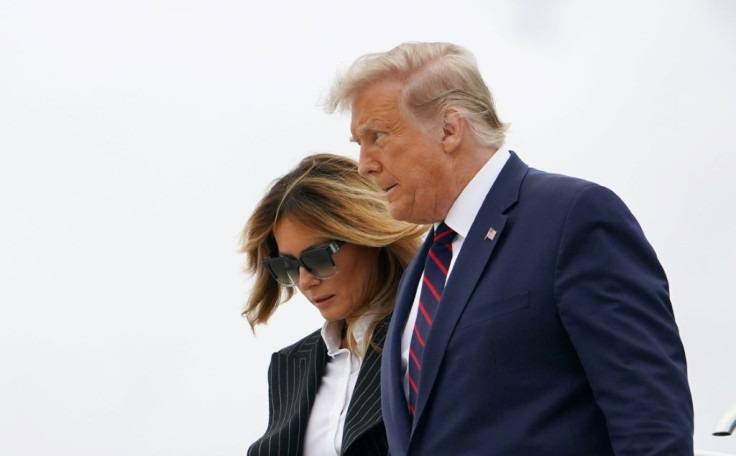Trump 'Much Better' But WH Doctor Says 'Not Yet Out Of The Woods'
US President Donald Trump posted a video Saturday from the hospital where he is battling Covid-19, saying he was improving and would be "back soon" -- but acknowledged that the crucial coming days would be "the real test."
"I came here, wasn't feeling so well. I feel much better now," Trump, 74, said from his business suite at the Walter Reed military medical center near Washington.

"We're working hard to get me all the way back... I think I'll be back soon and I look forward to finishing up the campaign the way it was started."
Appearing relaxed in an open-collar shirt and blue suit jacket, Trump acknowledged there was uncertainty about the course of the disease, which can hit recovering patients hard with no warning.
"I'm starting to feel good. You don't know over the next period of a few days, I guess that's the real test, so we'll be seeing what happens over those next couple of days."

Trump's wife also tested positive but he said her symptoms were not as bad as his own.
"Melania is really handling it very nicely. As you've probably read, she's slightly younger than me, just a little tiny bit," he joked about the 50-year-old first lady.
Late Saturday, White House doctor Sean Conley said Trump was "not yet out of the woods," but that the medical team is "cautiously optimistic."

White House Chief of Staff Mark Meadows said Trump's condition had them worried on Friday, but that he had since improved.
"Yesterday morning, we were real concerned... he had a fever and his blood oxygen level had dropped rapidly," Meadows told Fox News late Saturday.
Meadows said there was never a risk Trump would have to hand over power to Vice President Mike Pence, after a day of conflicting reports and confusion over the leader's actual fitness.

"He's made unbelievable improvements from yesterday morning, when I know a number of us, the doctor and I, were very concerned," Meadows said.
His comments echoed remarks by Conley, who said Trump had "made substantial progress since diagnosis, and remained "fever-free and off supplemental oxygen."

Trump had completed a second dose of therapeutic drug remdesivir and had spent "most of the afternoon conducting business," Conley added.
Conley was evasive when asked earlier whether the president had received supplementary oxygen at any point since falling ill, only confirming that he hadn't received any at the hospital or on Thursday -- the day of his positive test.
Several US media outlets said Trump was on oxygen at the White House on Friday before being admitted to Walter Reed.

Conley added to the confusion by suggesting that Trump had been diagnosed on Wednesday -- not on Thursday, per the official account -- but he later said he had misspoken.

Soon after Trump arrived at the hospital, Conley said in a memo the president was starting a course of remdesivir and had received an eight-gram dose of an experimental antibody cocktail.
Neither Trump's doctors nor the White House explained why the president was taking unproven drugs if his progress was satisfactory.
Trump's optimism over his recovery prospects has been tempered by news that more people close to the president have tested positive for the coronavirus.
They included campaign advisor Chris Christie, who was among several aides that helped Trump prepar
e for the first presidential debate who have since announced positive tests.
Christie and a number of senators and Trump aides are also among a growing list from the president's orbit to have tested positive after attending an event in the White House Rose Garden last weekend.
The so-called "White House cluster" includes the president's wife Melania, close confidante Hope Hicks, former White House top aide Kellyanne Conway, campaign manager Bill Stepien and Republican senators Thom Tillis and Mike Lee.
Another close aide, Nicholas Luna, one of the "body men" who accompanies the president round the clock, had also tested positive, CNN reported.
Heightening the sense of crisis at the heart of power in America, a third Republican senator, Ron Johnson of Wisconsin, announced on Saturday that he had tested positive.
Public health experts have expressed alarm at the outbreak linked to the September 26 celebration of conservative judge Amy Coney Barrett's nomination to the Supreme Court.
"They relied too much on diagnostic testing. We know that these tests have a very high false negative rate," said Ali Nouri, president of the Federation of American Scientists.
"By simply relying on these diagnostics to determine who gets to come in and out of the White House, and by not requiring other protections, like social distancing and masks, they created a false sense of comfort for the White House."
Democrats have called for Barrett's Senate confirmation hearings to be postponed after several Republican senators tested positive, but judiciary committee chair Senator Lindsey Graham said they would go ahead.
Trump -- who is well behind his 77-year-old Democratic election rival Joe Biden in the polls -- has been forced to freeze or rework much of his campaign ahead of a potentially messy vote on November 3.
The former vice president, who stood on a stage with Trump for 90 minutes during their ill-tempered first debate Tuesday, announced that he and his wife Jill tested negative Friday.
Biden reminded voters during the debate that he has pushed consistently for a serious approach to the coronavirus, which has killed more than 208,000 Americans, unlike his opponent who has mocked the Democrat for his rigorous use of masks.





















